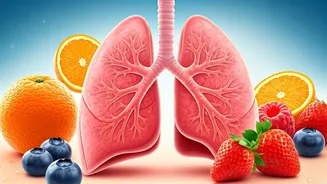The Pollution Problem
Air pollution is a pervasive issue, and its impact on our lungs is undeniable. Fine particulate matter, ozone, and other pollutants can inflame and damage
the delicate tissues of the respiratory system. These particles, often generated from vehicle emissions, industrial activities, and other sources, can penetrate deep into the lungs, causing a cascade of adverse health effects. The consequences range from mild irritation and respiratory infections to more serious conditions like chronic obstructive pulmonary disease (COPD) and even lung cancer. Understanding the extent of the pollution problem is the first step in considering preventative measures, including dietary choices.
Fruit's Protective Potential
Research has increasingly highlighted the role of diet in mitigating the harmful effects of air pollution. Fruits, rich in various vitamins, antioxidants, and other beneficial compounds, are emerging as key players in this protective mechanism. Antioxidants, in particular, are crucial in neutralizing free radicals, which are unstable molecules formed when the body is exposed to pollutants. Free radicals can cause cellular damage, leading to inflammation and disease. Fruits can provide a defense against these free radicals and can help to reduce lung damage.
Antioxidants: The Powerhouses
The antioxidant properties found in fruits are primarily responsible for their protective effects. Vitamins C and E, as well as various flavonoids and carotenoids, are among the most potent antioxidants present in fruits. These compounds work at the cellular level, scavenging free radicals before they can inflict damage. The intake of fruits like citrus fruits and berries, which are high in antioxidants, has been associated with improved lung function and decreased respiratory symptoms in polluted environments. Further, these antioxidants can help reduce inflammation, offering another layer of protection to the lungs.
Fruit Champions for Lungs
While many fruits offer lung-protective benefits, some stand out due to their particularly high concentrations of beneficial compounds. Berries, for instance, are packed with antioxidants, including anthocyanins, which give them their vibrant colours and potent antioxidant activity. Citrus fruits, such as oranges and grapefruits, provide a generous dose of Vitamin C, which can act as a powerful antioxidant in the lungs. Apples, rich in quercetin, a flavonoid known for its anti-inflammatory effects, are also beneficial. Incorporating a variety of these fruits into your diet can maximize the protective effects against air pollution.
Dietary Strategies for Health
Adopting a lung-protective diet doesn't necessitate a drastic overhaul of your eating habits; it's more about making informed choices and gradually integrating beneficial foods. Aim for a diverse intake of fruits, incorporating a variety of colours to ensure a wide spectrum of nutrients and antioxidants. Consider adding berries to your breakfast, snacking on an apple, or including citrus fruits in your daily meals. Ensure you're consuming enough water to stay hydrated, which is essential for healthy lung function. Moreover, limiting exposure to pollutants by staying indoors during high-pollution days and using air purifiers can also help protect your lungs.
Beyond Fruit: Holistic Approach
While fruits play a crucial role in lung health, they are just one piece of the puzzle. Maintaining a healthy lifestyle that includes regular exercise, avoiding smoking, and managing stress also contributes significantly to overall well-being. Exercising outdoors when pollution levels are low can help improve lung capacity and function, further bolstering the protective effects of fruits. Staying hydrated, getting adequate sleep, and managing chronic conditions like asthma or allergies are also critical components of a holistic approach to lung health. It's about creating a complete strategy for safeguarding your respiratory system.
The Future of Research
The relationship between diet and lung health is an active area of scientific exploration. Future research will delve deeper into identifying specific fruits and compounds that offer the greatest protective benefits against air pollution. Scientists are also working to understand how these dietary interventions can be best integrated into public health recommendations. Further, researchers are investigating how these findings can be used to create personalized nutrition plans and interventions tailored to individual needs and environmental conditions. Continued study promises to refine our understanding and provide increasingly targeted strategies for safeguarding our lungs.












